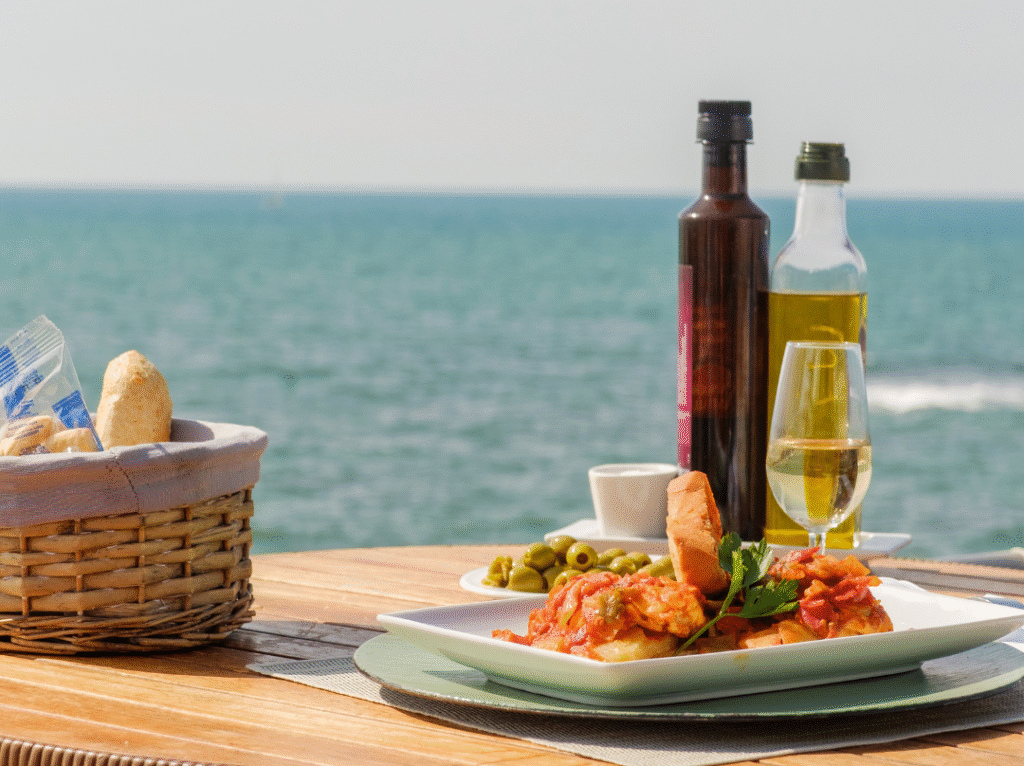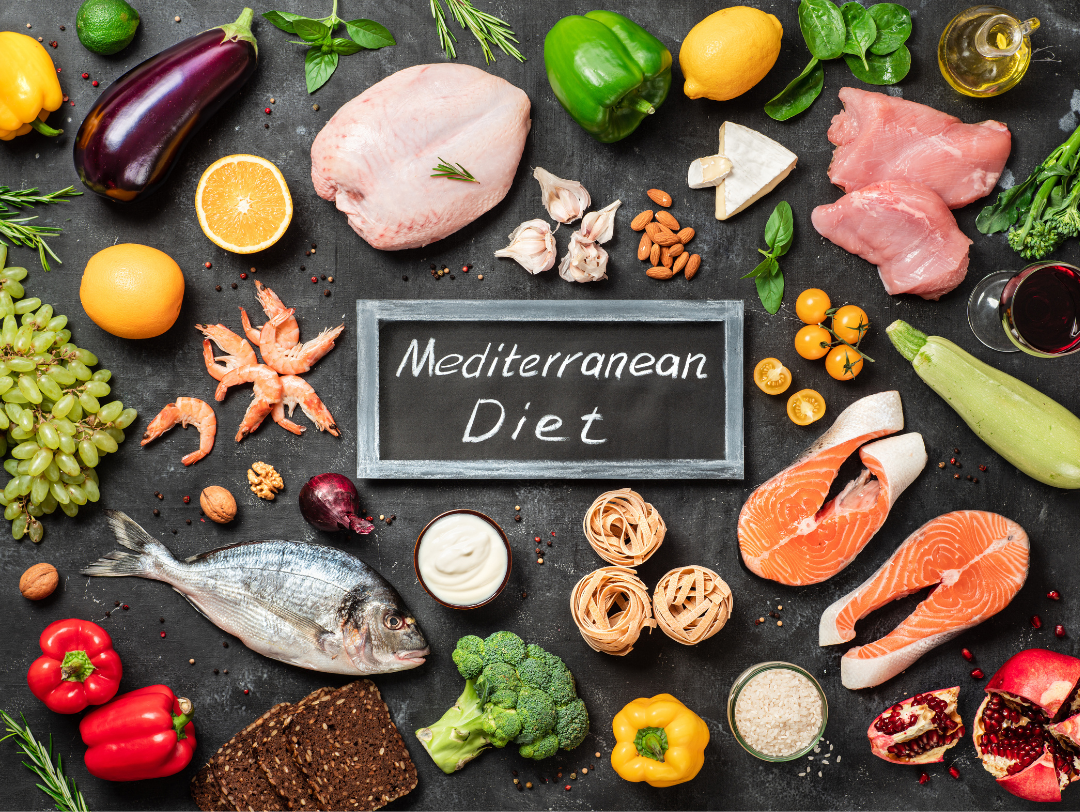As the name suggests, the Mediterranean Diet (MedDiet) is followed by countries surrounding the Mediterranean Sea, such as such as Greece, Italy, Turkey, France, Portugal and Spain. It is associated with significantly less chronic diseases, especially cardiac ailments, diabetes and cancer. The diet consists of plenty of healthy, fresh and seasonal fruit and vegetables, legumes, unprocessed grains, fish containing omega 3, and moderate amounts of poultry, meat and dairy.
In addition, the diet includes plenty of seeds, nuts and extra virgin olive oil, the latter two containing high amounts of monounsaturated fats, which are associated with lowering cholesterol and inflammation. Olive oil also contains polyphenols, which act as antioxidants, protecting the vascular system from inflammation and reducing rates of cancer. Olive oil is also safe to use at higher cooking temperatures such as roasting due to the high antioxidant levels, protecting the oil from oxidising and becoming unstable. The MedDiet has also been associated with longevity and lower rates of alzheimers and dementia ¹. Please view the pyramid below with tips of how you can introduce the MedDiet:

- At the base of the pyramid you will notice that lifestyle, socialising, family and exercise are a vital part of the Mediterranean lifestyle, as per the quote “Il dolce far niente” in the movie “Eat Pray Love”, which translates to “the sweetness of doing nothing”. This is really quite a common theme in the Mediterranean area, where enjoying leisurely activities and mindful eating is key to happiness. So your take home is, try to slow down in life, breathe and relax, enjoy your meal times and try socialise with family and friends as often as you can.
- The next level is focussed on plenty of fruits, vegetables, olive oil and water. Try to eat 1-2 portions of fruit, 4-5 portions of vegetables and 6-8 glasses of filtered water daily. You want to make sure that the fresh produce is organic, or rinse it well in a large bowl with 1 part vinegar and 3 parts water, or a tablespoon of bicarbonate of soda per litre (4 cups) of water. You can also incorporate plenty of herbs, onions and garlic to your cooking, which add to the flavour and have medicinal properties. Make the fruit and vegetables the star of your meals, allocating about half of the plate to them.
- You want to include plenty of organic, unprocessed wholegrains, nuts, seeds and legumes into your diet. You can include 1-2 servings of wholegrains per meal, or 1-2 servings per day if you are following a low-carb diet, 1-2 portions of nuts/seeds per day and 2-3 portions of legumes per week. One quarter of the plate should be dedicated to wholegrains. Vegetarians and vegans will be able to enjoy more of these foods, which are good vegan sources for protein.
- Try to include plenty of fish and seafood into your diet, especially fatty fish such as sardines, mackerel, salmon, anchovies or herring. These contain high amounts of omega 3, which acts as an anti-inflammatory and protects the cardiovascular system. Seafood is high in zinc, which boosts the immune system and is vital for neurotransmitter and hormone production. You want to try eat 2-3 portions per week from this food group. Eggs are also really healthy and contain high amounts of vitamin A and D, and 3-4 portions and 2 servings of poultry can be enjoyed per week. Fermented dairy such as Greek yoghurt is eaten moderately and contains beneficial bacteria that boosts gut health and immunity. Try to limit intake to 1-2 portions per day. MedDiets also include a variety of goat’s and sheep produce, which may be more suitable to people sensitive to dairy. You want to allocate a quarter of your plate to the protein food group.
- Red meat is eaten more sparingly, about 1-2 servings per week. Try to eat organic and avoid eating processed meats that contain high amounts of preservatives, such as nitrates that promote colon cancer. Grass-fed cows contain high amounts of omega 3, therefore this is favourable.
- Sweets, sugar and confectionary are enjoyed sparingly, about 2 portions per week, and natural sources of sugar such as desserts made with honey and nuts are often enjoyed. Desserts are usually home-made, limiting the sugar and and enjoyed sparingly. So do treat yourself once in a while, but don’t eat overly processed and artificial sweets and desserts.
- Alcohol and especially red wine is had in small amounts and enjoyed with food. Numerous studies have been done warning of the risks of alcohol, but the side effects seem to be ameliorated in MedDiets diets, probably due to the high antioxidant content of the foods consumed ². Therefore if you chose to drink, drink small amounts and preferably red, organic wine with meals. Coffee can be enjoyed, in moderation (2-3 cups max per day) and preferably unsweetened and without creamers. try to also include unsweetened herbal teas.
So, in summary, try to savour the moments, drink and eat moderately and enjoy the small things in life, with a relaxed and low-stress attitude and make an effort to be around friends, family and loved ones. Focus on whole, seasonal foods, avoid processed or fried food and damaged fats like margarine, and for gluten-sensitive people, you can enjoy sourdough bread or gluten-free grains such as buckwheat, quinoa or legume pasta.

¹ Guasch-Ferré M, Willett WC. The Mediterranean diet and health: a comprehensive overview. J Intern Med. 2021;290(3):549-566.
² Barbara-Latasa M, Bes-Rastrollo M, Pérez-Araluce R, Martínez-González MÁ, Gea A. Mediterranean Alcohol-Drinking Patterns and All-Cause Mortality in Women More Than 55 Years Old and Men More Than 50 Years Old in the “Seguimiento Universidad de Navarra” (SUN) Cohort. Nutrients. 2022;14(24):5310.



